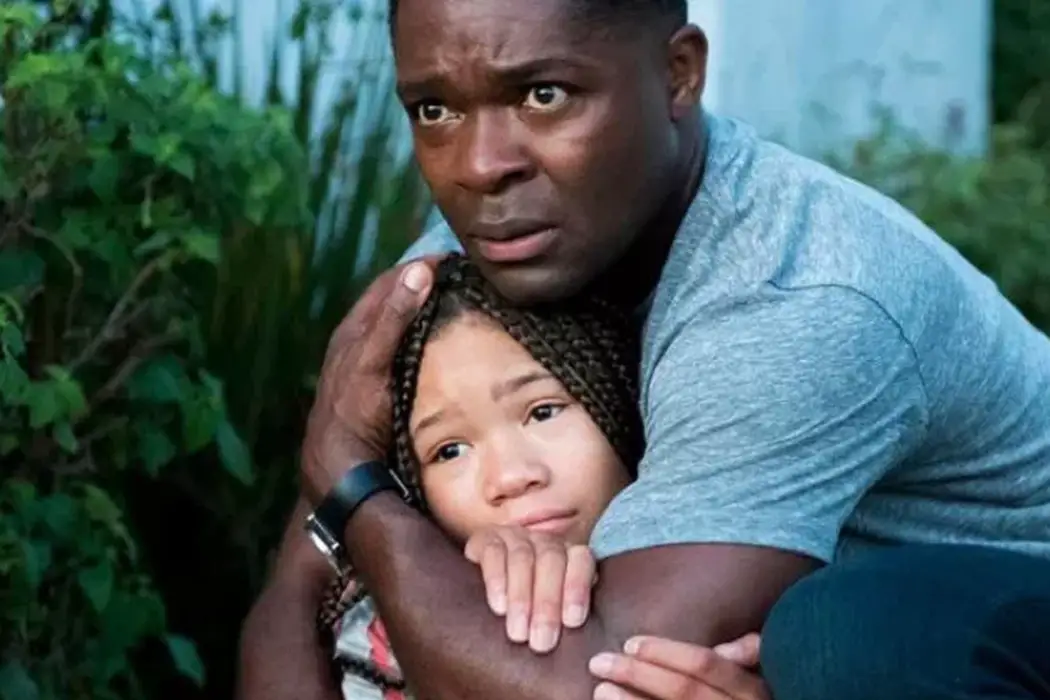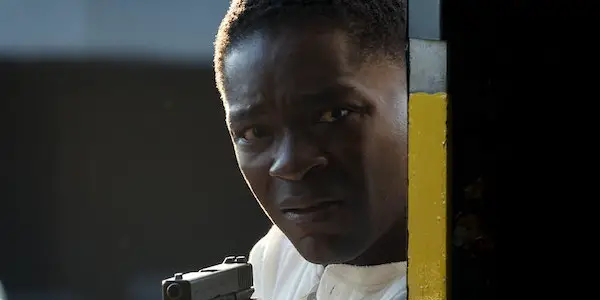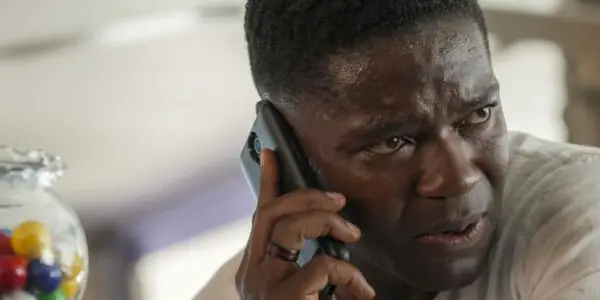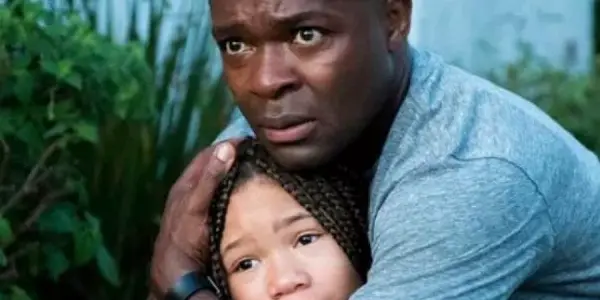DON’T LET GO: Time Travel Thriller Loses Its Way

Andrew Stover is a film critic/writer from the Chicagoland. His…
From the looks of it, director Jacob Estes is deploying inspiration from Gregory Hoblit’s Frequency, a movie that uses the conception of time travel to layout an unforeseen situation where a man in 1999 is able to communicate to his father in 1969, even though his father died when the man was only 6-years-old. Don’t Let Go is more or less similar to Frequency, but paves its own narrow path that encounters far too many detours that go nowhere. With a mystifying premise at the center, there are bounteous possibilities that could have unfolded in Estes’ supernatural thriller. Unfortunately, after an absorbing setup, and when the movie begins misprizing the time travel element and focuses more on who did it and why they did it, Don’t Let Go loses its way.
When somebody you love is taken from you in death, you aren’t able to say the things you needed to say to them before they died. Maybe you feel like you let them down because you left on a bad note, or maybe…just maybe you feel responsible for their death. L.A. Detective Jack Radcliff (David Oyelowo from Selma) has a close relationship with his niece Ashley (Storm Reid from Euphoria, who’s destined for more roles).
When Ashley’s father (Jack’s brother) doesn’t pick her up from a movie, she phones Uncle Jack and he immediately comes to her rescue. A scene at a diner has the two of them conversing about Garrett’s shortcomings, and how he isn’t the most reliable father. But after Uncle Jack exchanges a few words with Garrett, Ashley is optimistic that her father is willing to change. Woefully, Ashley’s fate is sealed by darkness. After a disturbing call from Ashley, Jack discovers Garrett, Ashley’s mom, and Ashley, brutally murdered in their home.

Jack is now mourning the loss of his niece, blaming himself for not getting there in time. The investigation suggests a murder-suicide, but Jack isn’t buying any of it and thinks something else is at play here. Then one day, Jack gets a phone call from Ashley beyond the grave. At first, he thinks his grief and rage has manifested this hallucination, but he soon embraces the supernatural. Realizing Ashley is calling him from two weeks ago, Jack and Ashley work together, in disparate timelines, to try to unmask the person or people responsible for the murders. And in the process, maybe they can reverse time, and maybe Ashley can be saved.
Fascinating Premise Has A Lot Of Potential
The premise of Don’t Let Go is fascinating, with the initial build-up of Don’t Let Go ensnaring you in its grasp. Courtesy of David Oyelowo’s avid face acting, Jack is sketched as this wired and admirably resolute detective, while also being a solicitous and softhearted uncle, who treats Ashley as if she was his own daughter. In this case, Jack isn’t only the fun uncle, he’s basically the clear-headed uncle trying to keep Ashley alive.
It’s asking a lot to make viewers care about their relationship when we simply get one scene of them at a diner, but the scene plays out in an endearing manner. Whether it is face-to-face or via phone, Oyelowo and Reid have engaging chemistry, ingrained with a tolerable (if slightly hammy) sense of closeness. The core relationship propels the narrative further and attempts to sustain an emotional beat. When emotion and logic get lost in the shuffle of the time-twisting application, Oyelowo keeps audiences glued to the screen with his fidgety behavior and staunch attribute.
Don’t Let Go is quite effective when laying out the groundwork for the plot and Jack’s motivations. The actual murder of Ashley, Garrett and Ashley’s mother is off-screen, but the aftermath is vividly seen through Jack’s perspective, who rushes to Ashley’s house with caution, but it’s too late. Occasionally violent and consistently bleak, when the time-bending ingredient is sprinkled in, the movie wields prolific potential. Running aimlessly in circles is Jacob Estes (director and co-writer), who finds himself taking the wrong direction after developing an immersive setup. For whatever reason, Don’t Let Go becomes a tired cop movie, with all of the maddening cop movie clichés. It becomes a ‘whodunit’, and dares to ask why they’ve done it, but the answer is not at all satisfying or surprising.

Like any cop movie, and like any meticulously crafted suicide, there’s more to the story. Being ruled a murder-suicide, Jack isn’t convinced, and against his captain’s orders to take some time off and endure the cycle of grief in peace and quiet, Jack embarks for the truth. But when he gets the call from Ashley beyond the grave, she happens to be alive, in a way. This version of Ashley is currently embroiled in a different timeline, two weeks before her death. Jack and Ashley can only communicate by phone because they’re in distinct realities, but that doesn’t stop them from working together to solve and possibly obviate the murder from ever befalling.
Ditch The Butterfly Effect notion, Don’t Let Go is more set on giving Uncle Jack the chance to redeem himself and potentially save his niece with very few restrictions. Of course, the biggest obstacle Jack faces is that he’s situated in a different timeline from Ashley, but it’s not like deciding to tell Ashley what happens to her can cause more harrowing results (but his efforts can still churn out a similar outcome, unfortunately).
Distorted Identity & Flimsy Execution
Then again, the film’s identity is distorted and dubious. What exactly is Estes going for? Is Don’t Let Go a thriller incorporating parallel universes, or is the movie embracing the idea that when you die, you don’t actually die because you’re transported to another world (which does sound intriguing)? None of it is made lucid, but that’s less concerning (hell, maybe the dubiety is even admirable) than how Estes utilizes it to uphold a predictable cop thriller.
Maybe Estes was originally trying to focus the time-altering plot device around the central relationship, and the lengths one would go to save the person they love — but it’s not like Jack and Ashley’s relationship is strong enough to overcome the cop movie platitudes. The execution is flimsy and monotonous, with Estes piling on police corruption without an ounce of originality, and employing an undetermined time travel component without much clarity.
Transitioning back and forth between Jack’s timeline and Ashley’s timeline does become hopelessly disorienting — to the point that smaller details, which should initially hold dire weight, aren’t as rewarding (why was Ashley’s backpack wet and how did it get at the scene of the crime, and who is “Georgie” again?). The mystery becomes muddled by Estes’ messy approach. The tension lingers throughout but the emotional significance of Jack’s journey for vengeance and redemption isn’t as potent. Don’t Let Go never let’s go of its complicated nature, but it does shamelessly exploit the abstractions at play here for the sole reasoning of packaging a safe thriller, which ultimately becomes needlessly confounding and hollow.

The setting of Los Angeles is a familiar but welcoming choice for a thriller like this one because it supplies a city of possibilities and a city of suspects. Like any large, sprawling city, LA is home to criminals and corrupt officials. Commendably, cinematographer Sharone Meir knows how to capture LA through a refreshing lens by taking us through Ashley’s flat neighborhood (and I do mean that in the best possible way). Ashley’s neighborhood is just like every other neighborhood, but it’s her neighborhood. It’s the place she considers to be home — which essentially explains how she’s able to escape the enemies who relentlessly chase her because she knows her way around (including every alleyway). (Fun fact: when first premiering at Sundance earlier this year, the piece apparently took place on a rustic farm in Ohio.) Regrettably, there’s no stability in the camerawork (using handheld/shaky cam), but the suspense and violence do hit hard (even if it’s off-screen, the gunshots are grating).
Don’t Let Go Possesses A Talented Cast But Employs Vexing Clichés
Wearing all of the hackneyed trappings and foreseeable betrayals one would expect from a cop picture so clearly tainted, Don’t Let Go is a curious mess. On one hand, the first 30 minutes plants the seed of intrigue, but instead of letting the mystery brew into something stirring, innovative or existential, it adequately functions as a confused thriller with solid performances and embedded tension.
Don’t Let Go brings up a compelling idea: What would happen if a person you loved was murdered, and their death created a wrinkle in the space-time continuum, allowing you to communicate, whilst in different timelines? What’s happening to Jack and Ashley is unearthly, but Estes doesn’t polish up the film’s own principals. On the surface, Don’t Let Go sounds clever and mystical, but it’s enfeebled by a police-corruption subplot that unravels in half-baked realizations and twists. It’s a time-consuming thriller with alluring configuration and very little payoff.
What is your favorite time travel movie? What is your favorite cop thriller? Let us know in the comments!
Watch Don’t Let Go
Does content like this matter to you?
Become a Member and support film journalism. Unlock access to all of Film Inquiry`s great articles. Join a community of like-minded readers who are passionate about cinema - get access to our private members Network, give back to independent filmmakers, and more.
Andrew Stover is a film critic/writer from the Chicagoland. His film & TV reviews can be found on Film Inquiry & Film Threat.













